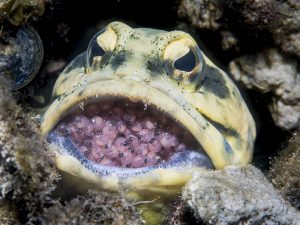
Eyed eggs in a mouthbrooder (photo credit: The Fish Room).
Guest post: Gretchen Stokes, University of Florida
Mouthbrooding is when fertilized eggs are carried and incubated in the parent’s mouth. Rather sophisticated for parental care in fishes, it may have evolved from lack of nest sites, predation or habitat invasion. It occurs in more than 53 genera of fishes. Mouthbrooding can be conducted by males (paternal), females (maternal) or both. While more commonly female, parental care by males occurs in some well-known species, including snakeheads and arowana. Parental feeding is fairly or fully restricted during incubation, as swallowing or chewing could harm egg development. Brood parasitism can also occur, where a parasitic fish attacks the brooder’s eggs and leaves behind the fertilized eggs for care by the mouthbrooder (e.g. mochokid catfish eggs incubated in cichlid parent’s mouths).
